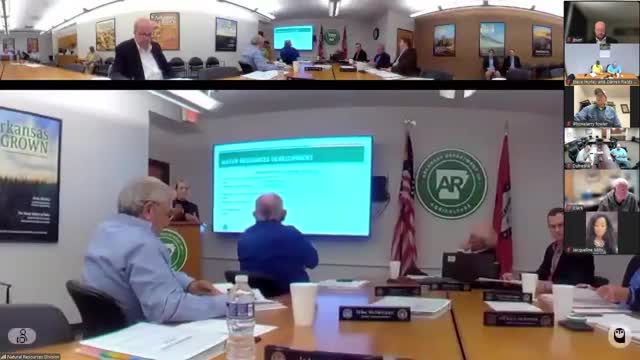Water Funding Strategy Revealed as Officials Aim to Keep Rates Below 3% of Household Income
This article was created by AI summarizing key points discussed. AI makes mistakes, so for full details and context, please refer to the video of the full meeting. Please report any errors so we can fix them. Report an error »

The Arkansas Natural Resources Commission (ANRC) meeting on November 21, 2024, highlighted critical funding strategies aimed at improving water and wastewater infrastructure across the state. A key focus was the process for determining eligibility for principal forgiveness on loans, which is essential for making these projects financially viable for communities.
During the meeting, officials explained that funding applications undergo a thorough analysis of the applicant's financial status, particularly in relation to median household income. If a community's loan burden exceeds 1.5% of its median income, it may qualify for principal forgiveness, which can significantly reduce the financial strain on residents. This formula is crucial, as it ensures that funding decisions are not arbitrary but based on established guidelines.
The commission announced plans to recommend approximately $69.7 million in loans from the Clean Water State Revolving Fund and $86.7 million for drinking water projects, alongside substantial principal forgiveness amounts. These figures underscore the commission's commitment to addressing the pressing needs of Arkansas's water systems, particularly in economically challenged areas like the Delta region.
Concerns were raised about rising water rates affecting low-income households, with some residents reporting bills nearing $100 monthly. The commission acknowledged these challenges and emphasized the importance of maintaining affordable rates while ensuring the sustainability of water systems. They noted that all water systems are required to conduct rate studies to align their pricing with operational costs.
The discussion also touched on the potential for revisiting the 1.5% threshold for loan eligibility, suggesting that input from various stakeholders would be necessary to determine if adjustments are warranted in light of recent inflationary pressures.
In conclusion, the ANRC's meeting reinforced the importance of structured financial assistance for water infrastructure projects, aiming to balance affordability for residents with the need for sustainable funding solutions. As the commission moves forward, it will continue to explore partnerships with other funding sources to maximize support for Arkansas communities.
During the meeting, officials explained that funding applications undergo a thorough analysis of the applicant's financial status, particularly in relation to median household income. If a community's loan burden exceeds 1.5% of its median income, it may qualify for principal forgiveness, which can significantly reduce the financial strain on residents. This formula is crucial, as it ensures that funding decisions are not arbitrary but based on established guidelines.
The commission announced plans to recommend approximately $69.7 million in loans from the Clean Water State Revolving Fund and $86.7 million for drinking water projects, alongside substantial principal forgiveness amounts. These figures underscore the commission's commitment to addressing the pressing needs of Arkansas's water systems, particularly in economically challenged areas like the Delta region.
Concerns were raised about rising water rates affecting low-income households, with some residents reporting bills nearing $100 monthly. The commission acknowledged these challenges and emphasized the importance of maintaining affordable rates while ensuring the sustainability of water systems. They noted that all water systems are required to conduct rate studies to align their pricing with operational costs.
The discussion also touched on the potential for revisiting the 1.5% threshold for loan eligibility, suggesting that input from various stakeholders would be necessary to determine if adjustments are warranted in light of recent inflationary pressures.
In conclusion, the ANRC's meeting reinforced the importance of structured financial assistance for water infrastructure projects, aiming to balance affordability for residents with the need for sustainable funding solutions. As the commission moves forward, it will continue to explore partnerships with other funding sources to maximize support for Arkansas communities.
View the Full Meeting & All Its Details
This article offers just a summary. Unlock complete video, transcripts, and insights as a Founder Member.
✓
Watch full, unedited meeting videos
✓
Search every word spoken in unlimited transcripts
✓
AI summaries & real-time alerts (all government levels)
✓
Permanent access to expanding government content
30-day money-back guarantee
